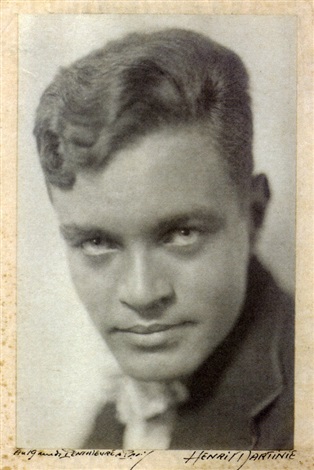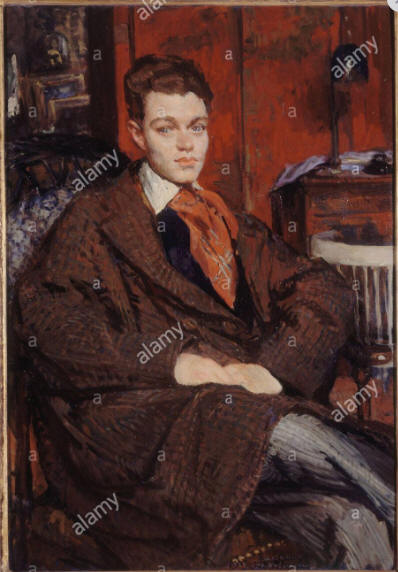

Partner Eugene McCown
Queer Places:
Sorbonne, Sorbona, Parigi, Francia
Cimetière de Montrouge, 18 Avenue de la Porte de Montrouge, 75014 Paris, Francia
 René Crevel (10 August 1900 – 18 June 1935) was a French writer involved
with the surrealist movement.
René Crevel (10 August 1900 – 18 June 1935) was a French writer involved
with the surrealist movement.
Crevel was born in Paris to a family of Parisian bourgeoisie. He had a traumatic religious upbringing. At the age of fourteen, during a difficult stage of his life, his father committed suicide by hanging himself. Crevel studied English at the University of Paris. He met André Breton and joined the surrealist movement in 1921, from which he would be excluded in October 1923 due to Crevel's homosexuality and Breton's belief that the movement had been corrupted.
Rene Crevel's many friends included Gertrude Stein, the composer Virgil Thomson, and the painter Eugene McCown. With the latter, Crevel is known to have had a stormy homosexual relationship from 1924 to 1927; it inspired one of his best and most moving novels, La Mort difficile... published in America, translated by David Rattray, published as Difficult Death by North Point Press, 1985. Two years before his mother's death, Crevel published Detours, his first novel, while he was already living openly with the notoriously narcissistic and promiscuous American painter Eugene McCown, a former satellite of Jean Cocteau's circle of young men and a minor disciple of the same so-called neo-romantic school of painters.
The photographer George Platt Lynes went to Paris at the age of eighteen in 1925. He met Gertrude Stein and, through her, Pavel Tchelitchew, Carl Van Vechten, André Gide and René Crevel. Crevel would be his occasional lover. Back in the States that year, he published booklets by Stein and Ernest Hemingway under his own imprint, As Stable Publications.
Back in Paris again in the spring of 1926, Klaus Mann met René Crevel, a committed internationalist for perverse reasons: "He spent his days with Americans, Germans, Russians, and Chinese, because his mother suspected all foreigners to be crooks or perverts". Sitting on Mann’s bed, Crevel read out the early chapters of his novel La Mort difficile, with their "venomous" portrait of his mother. On this trip, Mann also met Jean Cocteau ("The hours spent in his company assume in my recollection a savour both of burlesque show and magic ritual"), Eugene McCown, Pavel Tchelitchew, Julien Green, Jean Giraudoux and others.
Rene Crevel by Pavel Tchelitchew

Tristan Tzara and Rene Crevel, by Man Ray

Rene Crevel
by Jacques-Emile Blanche
During this period, Crevel wrote novels such as Mon corps et moi ("My Body and Me"). In 1926, he was diagnosed with tuberculosis which made him start using morphine. The 1929 exile of Léon Trotsky persuaded him to rejoin the surrealists. Remaining faithful to André Breton, he struggled to bring communists and surrealists closer together. Much of Crevel's work deals with his inner turmoil at being bisexual.[1]
Crevel killed himself by turning on the gas on his kitchen stove the night of 18 June 1935, several weeks before his 35th birthday. There were at least two direct reasons: (1) There was a conflict between Breton and Ilya Ehrenburg during the first "International Congress of Writers for the Defense of Culture" which opened in Paris in June 1935. Breton, who, like all fellow surrealists, had been insulted by Ehrenburg in a pamphlet which said – among other things – that surrealists were pederasts, slapped Ehrenburg several times on the street, which led to surrealists being expelled from the Congress. Crevel, who, according to Salvador Dalí, was "the only serious communist among surrealists",[2] spent a whole day trying to persuade the other delegates to allow surrealists back, but he was not successful and left the Congress at 11pm, totally exhausted. (2) Crevel reportedly had learned that he suffered from renal tuberculosis right upon leaving the Congress (Claude Courtot[3]). He left a note which read "Please cremate my body. Loathing."
It should be remembered that when André Breton included the question "Suicide: Is It a Solution?" in the first issue of La Révolution surréaliste in 1925, Crevel was one of those who answered "Yes". He wrote "It is most probably the most correct and most ultimate solution."
My published books: